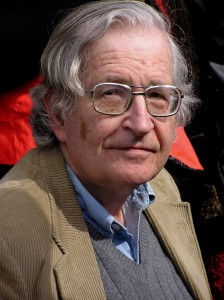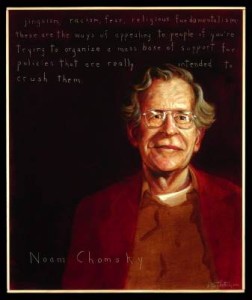 Noam Chomsky was born in Philadelphia to immigrant Russian parents, both of whom were Hebrew scholars and teachers. A child of the Great Depression, Chomsky’s political consciousness developed early: He saw women strikers being beaten outside a textile factory and rag sellers peddling their pitiful wares door-to-door in his neighborhood. To the 10 year-old Chomsky, the 1930s were “a time of political activism, debate, and great fear of Hitler conquering Europe. I saw the world as a complicated, frightening place.”
Noam Chomsky was born in Philadelphia to immigrant Russian parents, both of whom were Hebrew scholars and teachers. A child of the Great Depression, Chomsky’s political consciousness developed early: He saw women strikers being beaten outside a textile factory and rag sellers peddling their pitiful wares door-to-door in his neighborhood. To the 10 year-old Chomsky, the 1930s were “a time of political activism, debate, and great fear of Hitler conquering Europe. I saw the world as a complicated, frightening place.”
He studied linguistics at the University of Pennsylvania and Harvard and in 1957, while a professor at the Massachusetts Institute of Technology, he published Syntactic Structures a theory of “generative grammar” that transformed linguistics from an obscure discipline into a major social science. Outside of academia Chomsky is better known as a political activist—a role that he vigorously assumed as an early and outspoken critic and protester of the Vietnam War.

“ jingoism, racism, fear, religious fundamentalism: these are the ways of appealing to people if you’re trying to organize a mass base of support for policies that are really intended to crush them.” Portrait by Robert Shetterly/ Americans Who Tell the Truth.
In the 1966 essay, “The Responsibility of Intellectuals,” Chomsky challenged intellectuals “to speak the truth and expose lies,” and he carried his protests beyond the printed page: he became a tax resister and he was arrested in 1967 at the Pentagon while protesting military involvement in Southeast Asia.
Chomsky’s criticism of U.S. governmental policies has continued unabated since that time. In Deterring Democracy (1992) and in other books he has focused on trade and economic issues and accuses the Government of being a “rogue superpower.” “I’m a citizen of the United States,” says Chomsky, “and I have a share of responsibility for what it does. I’d like to see it act in ways that meet decent moral standards. It’s back to moral truisms: it’s of little value to criticize the crimes of someone else—though you should do it, and tell the truth. I have no influence over the policies of [other countries] but a certain degree over the policies of the U.S. It’s not a matter of expectation but of aspiration.” [Bio by Americans Who Tell the Truth.]
Read more about Noam Chomsky at chomsky.info.
Read articles by Noam Chomsky at Alternet.org.







Twitter
Google plus
LinkedIn